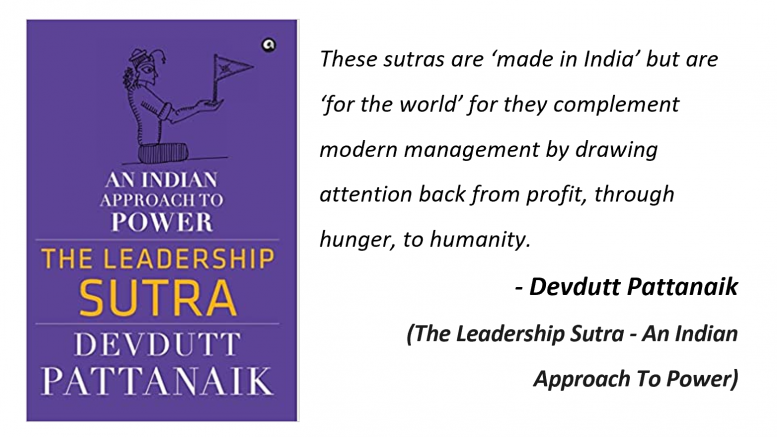Recently while browsing through a book section at the airport ‘The Leadership Sutra – An Indian Way to Power’ caught my attention. Although the book was published way back in 2016, the content still seemed relevant to the current time. The theme of co-relating mythology to contemporary business seemed interesting to me (as most of his other books are purely on mythology) hence I decided to read and review it. This book is one of the many editions of the business books written with the application of mythology to contemporary issues of management, administration, and leadership by Devdutt Pattanaik, who is well recognised for his writings on this subject.
The book offers compelling insights into how power and leadership are exercised. It analyses the human desire for significance, how regulations can undermine one’s self-worth, and how stability, even at the expense of freedom, is necessary. Durga the goddess of power in Hinduism, Buddhism and Jainism is the goddess of kings, rides a lion- the king of the jungle, a symbol of royalty across.
The role of power in management is generally not discussed and we fail to acknowledge how the desire to dominate often destroys the best of enterprises. Power, which is often viewed negatively, is a strong tool that facilitates the execution of any idea. Any effort to control it through regulations only domesticates it and fuels animosity while failing to energise the organisation. The goal of leadership is to be secure enough to outgrow the lion within us and enable and empower people around us. Nevertheless, leaders frequently compare themselves to lions and indulge their drive to dominate. Nonetheless, it is difficult since even the finest leaders can succumb to anxiousness.
What does the book cover?
The book is divided into chapters that focus on various mythology-related concepts. Every narrative concludes with a lesson and a case study that includes contemporary leadership problems or instances that one can identify with.
Top three interesting aspects from the book (chosen randomly)
- Unless we change, we cannot grow – Here, the tale of Serpent Kaliya and Krishna is told (Read the transfer story to relate to it). putting into context the reality that nothing will ever stay the same in the world. We will continue to feel anxious and let down if we merely observe how fate shifts. Instead, if we concentrate on the lessons that may be learned from every upswing and downswing, we will continue to advance.
- Only another human being can endorse the mental image – All human beings want to be identified and valued. When we are recognised we feel powerful. We want to feel significant, a certain position in the hierarchy – a sense of status and prestige. Hence human beings feel insecure around strangers until they are recognised. We share business cards, introduction and achievements to bring that awareness about oneself and feel secure and powerful.
- We see things not thoughts – Possessions are resources. They are tangible and measurable. Potential is not tangible and measurable. In the world of management where measurement matters, Narayan (who-we-are) is ignored and Narayani (what-we-have) is preferred. An employee’s skill matters, not his fears, vision or feelings.
What’s in it for me?
I enjoyed reading it. Mythological stories have always been fascinating and this combination as an amalgamation has made the reading even more interesting. I loved the way the author compared contemporary workplace leadership challenges to mythology. Undoubtedly, a different perspective from the typical business or leadership books I have read so far.
My recommendation
The book offers readers intriguing insights as it blends current leadership with Indian mythology in a distinctive way. It is an easy read, and I am confident that anyone who picks it up will find the ideas and thoughts conveyed to be quite relatable and straightforward to navigate.
The views and opinions published here belong to the author and do not necessarily reflect the views and opinions of the publisher.



Be the first to comment on "The Leadership Sutra – An Indian Approach to Power"